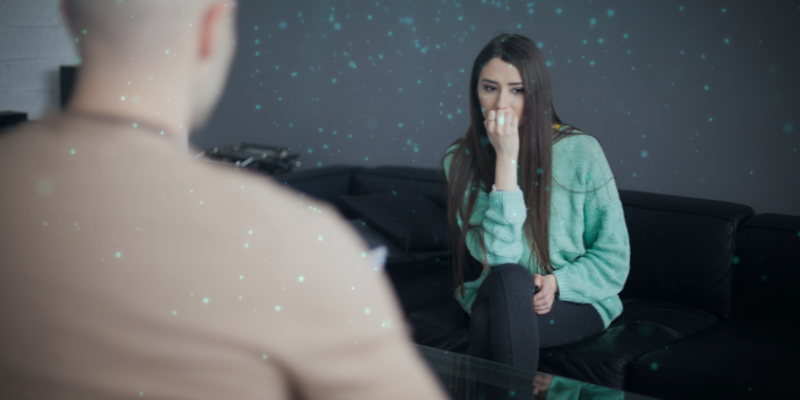
We all experience anxiety at some level—in fact, it’s crucial to human survival. But sometimes worry, fear, and nervousness surpass a useful or typical amount, developing into anxiety disorders. Anxiety is the mot common mental health condition in the U.S., with 40 million adults, or more than 18% of the population, affected every year.
Anxiety can also intersect with many other mental health conditions, including panic attacks or panic disorder, clinical depression, post-traumatic stress disorder (PTSD), obsessive-compulsive disorder (OCD), and phobias. It can trigger physical symptoms, such as rapid heartbeat and muscle tension, and interfere with work, school, and relationships.
Conversely, anxiety may result from deeper issues that require their own attention, such as medication interactions, substance abuse, or head injury.
The good news is, if you’re facing anxiety, seeking professional help can make a significant positive impact on your day-to-day life and long-term health. And, today, there are a number of psychotherapy modalities that have been shown effective for anxiety.
Here, we’ll examine 10 popular types of mental health therapy, how they work, and how they can assist in quelling anxiety symptoms.
If you’re facing anxiety, seeking professional help can make a significant positive impact on your day-to-day life and long-term health. Click To Tweet10 TYPES OF THERAPY FOR ANXIETY
- Cognitive behavioral therapy (CBT), true to its name, aims to change the way you think and act. Specifically, it is designed to help you evolve from negative thinking patterns and behaviors to healthier ways of coping.
This method is helpful for a long list of mental health conditions, including:
- Anxiety
- Major depressive disorder
- OCD
- PTSD
- Phobias
- Panic attacks
You’ll learn how to challenge automatic negative thoughts (ANTs), face fears, set goals, and engage in more positive self-talk. With practice, using CBT techniques can lessen stress and anxiety, boost moods and motivation, and improve self-confidence.
- Dialectical behavioral therapy (DBT) is particularly beneficial for those who could be described as rigid or inflexible, because it encourages exploring different perspectives and ideas.
One study, published in Trends in Psychiatry and Psychotherapy, tested both CBT and DBT on subjects with generalized anxiety disorder. Afterward, both groups showed reduced scores for depression and anxiety and increased scores for executive function.
Although CBT is more widely known, results suggested that dialectical therapy was more effective for improving executive function. The study noted that DBT’s focal points of emotional regulation, distress tolerance, mindfulness, and interpersonal relationships were factors likely to improve anxiety symptoms.
- Eye movement desensitization and reprocessing (EMDR) can be especially helpful for anxiety that is associated with trauma, including PTSD, as well as phobias and panic disorders. When traumatic memories get “stuck” in the brain, they can lead to intrusive and unwanted effects, such as experiencing flashbacks or anxiety.
EMDR therapy works to help reprocess the trauma through bilateral stimulation of the brain, via practices like tapping or eye movements.
This ultimately helps change the way the brain stores these traumatic memories and can help reduce or eliminate their associated negative emotions. Patients may notice improvement after 4 to 12 sessions, and EMDR can be utilized alongside other therapeutic approaches.
- Neurofeedback therapy taps into the power of the brain to improve emotional and behavioral health. Neurofeedback has been associated with reduced symptoms of anxiety disorders and stress, including in a 2021 study published in Basic and Clinical Neuroscience.
During a session, you play a computerized video game with your mind as electrodes placed on the scalp measure brainwave activity. Neurofeedback trains the brain on the spot by coaching you to help attain the optimal state of activity.
Ultimately, this process helps you learn to self-regulate your brain, with benefits that last long after the session ends—leading to improvements in work, school, home life, and relationships.
- Mindfulness cognitive therapy may help with anxiety while offering numerous additional mental health benefits. One study, published in Frontiers in Psychology in 2022, stated that mindfulness-based interventions appeared to be a “particularly promising and viable treatment approach” for reducing adolescents’ social anxiety symptoms.
Mindfulness cognitive therapy blends the Eastern tradition of mindfulness practices with Western approaches like CBT. This modality may also be supported by high-tech tools like an EEG-based neurofeedback device, shown in another study to improve symptoms of OCD, a form of anxiety.
- Exposure therapy, research suggests, may be especially useful for people with phobias. When you run from your anxiety—for example, flee a setting when fear is triggered—you can actually make anxiety worse.
Thus, in exposure therapy, you are guided through the practice of facing your fears. For example, you may make a list of situations that produce feelings of fear and anxiety, then—starting with the least-threatening ones—gradually begin facing them.
This modality can even incorporate computer-generated virtual reality as a safe way to confront fears. Over time, exposure helps the concerns seem less threatening, thereby reducing anxiety.
- Acceptance and commitment therapy (ACT) is an intervention that aims to increase psychological flexibility, according to the Association for Contextual Behavioral Science. It utilizes acceptance and mindfulness strategies, as well as behavioral change strategies.
Ultimately, you learn how to interact in a healthy way with fearful thoughts, feelings, memories, and physical sensations that you’ve previously avoided. You learn how to reframe and accept them, while changing your behavior in positive ways.
For example, one helpful exercise is defining your core values. By outlining these and allowing them to propel your actions, you’ll naturally lower anxiety and increase happiness by living a more purposeful life.
- Art and music therapy offer creative ways to combat anxiety. Art therapy encourages self-expression through visual art forms like painting, sculpture, and drawing. Music therapy and dance therapy use the power of music and movement to improve feelings of well-being.
One critical review in 2022 found that art therapy helped with emotion regulation (including emotion acceptance and goal-oriented actions), leading to anxiety reduction. The researchers noted that art therapy, which can be used as an adjunct treatment with other modalities, was associated with overall improved mental health in patients.
- Interpersonal therapy (IPT) is defined by the International Society of Interpersonal Psychotherapy as a time-limited (12-16 weeks) and diagnosis-targeted treatment, often used for major depression and other mental health disorders.
Therapists practicing IPT assist patients in solving interpersonal crises while helping them understand their emotions as social signals. Because IPT targets interpersonal factors that are increasing anxiety levels, it’s designed to improve personal interactions, bolster social supports, and reduce symptoms of conditions like anxiety.
- Psychoanalysis was originally introduced through the work of Sigmund Freud in the early 20th century, and it still impacts how therapy is approached today. Psychoanalysis is a type of therapy that’s designed to be implemented over a prolonged period, as the therapist explores deeper issues like unconscious drivers of behavior and family patterns.
The American Psychological Association notes that these unconscious forces can include repressed impulses, internal conflicts, and the effects of childhood trauma. These factors then impact mental health and resilience. Psychoanalysis may include techniques like free association, dream analysis, and analysis of resistances and defenses.
SEEKING THERAPY FOR ANXIETY
When your anxiety is interfering with daily life, tasks, and relationships, it’s time to seek help from a qualified medical professional. Therapy can help reduce symptoms while also improving various other mental health conditions that co-occur alongside anxiety.
Moreover, it’s crucial to explore the possibility of deeper mental, physical, and emotional issues at the root of anxiety. Finding the most effective therapy depends on which type of anxiety you have. The brain-imaging work at Amen Clinics using SPECT scans shows there are 7 types of anxiety (and depression), so it’s critical to know your type.
No matter which type(s) of anxiety therapy you choose, know that there is help available—and a brighter, more peaceful future ahead.
Anxiety, panic disorder, and other mental health issues can’t wait. At Amen Clinics, we’re here for you. We offer in-clinic brain scanning and appointments, as well as mental telehealth, clinical evaluations, and therapy for adults, teens, children, and couples. Find out more by speaking to a specialist today at 888-288-9834 or visit our contact page here.





Great suggestions. I'm in Oakland. My long term therapy was not helpful. I'm learning to face fears . Not easy but so far, it's working. Any Amen clinics nearby?
Comment by irene — January 22, 2024 @ 12:38 PM
My issue is my case of tinnitus. On a scale of 1-10, it is mostly a7 to 8, thus a problem with anxiety is prevalent. Which of the above therapies is most effective in this situation. Thank you.
Comment by Timothy Kelly — January 22, 2024 @ 10:03 PM
Good post. I am going through a few of these issues as well..
Comment by เว็บความรู้ — January 23, 2024 @ 6:20 AM
excellent suggestions!
Comment by Doug Morris — January 23, 2024 @ 1:49 PM